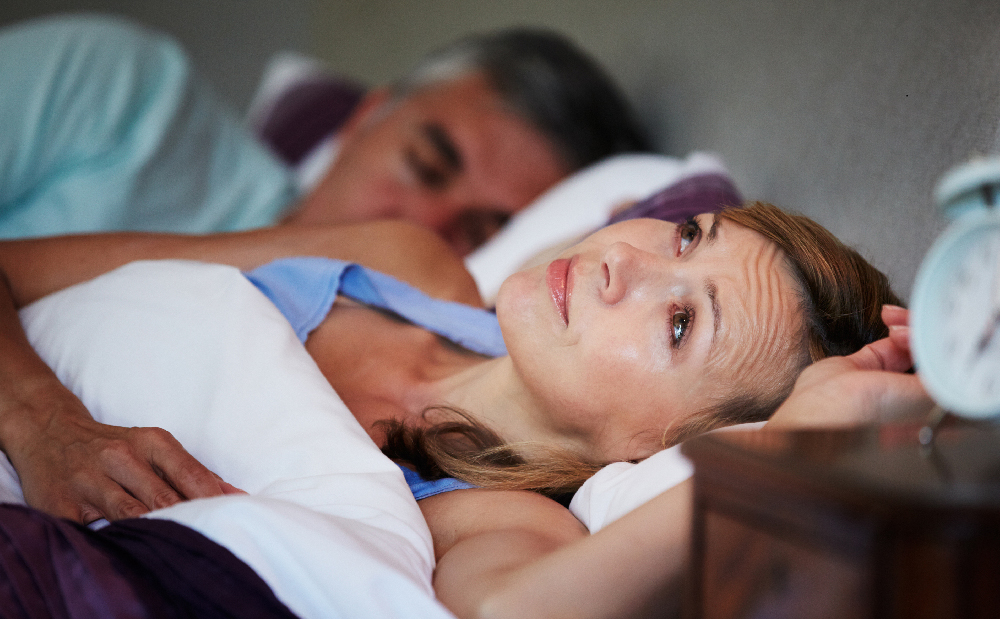
It’s no secret that menopause can seriously impact your sleep. Between hot flashes, night sweats, significant hormonal changes, and changes to your natural levels of melatonin — sleeping during menopause can be pretty problematic for some women.
A 2022 study showed that the amount of women who report having a sleep disorder jumps from 16 percent as teens to 60 percent after starting menopause. (1) The physical symptoms of menopause plays a pretty massive role in the lack of sleep that menopausal women face. Hot flashes specifically contribute to sleepless nights, since the increase in body temperature can disrupt our sleep patterns. (2)
Recently, CNN reported that Bayer AG’s experimental drug Elinzanetant was shown to improve the sleep of menopausal women by reducing the vasomotor symptoms that menopausal people experience while trying to sleep. Menopausal vasomotor symptoms are essentially hot flashes and night sweats, which are two of the most common symptoms of menopause. (3)
While this drug hasn’t been officially approved by the FDA, other drugs similar to Elinzanetant have recently been approved by the FDA to treat symptoms of menopause that interfere with sleep.
We’ve rounded up everything you need to know about Elinzanetant, and other treatments for menopause symptoms.
What Is Elinzanetant?
Elinzanetant is a non-hormonal drug that specifically targets the NK-1 and NK-3 receptors in the brain. According to the recent JAMA study on the drug, these receptors control thermoregulation in the brain, and as women begin menopause, these receptors can experience both hyperactivity and hypertrophy, which causes hot flashes and night sweats. The thought is that, by inhibiting these receptors, hot flashes and night sweats would become less frequent. (4)
Elinzaneetant has yet to be approved by the FDA, but a similar drug, fezolinetant or Veozah, was approved last year. However, according to CNN, Veozah is quite expensive, with a list price of $550 per month. While Bayer hasn’t announced any prices for Elinzanetant, it’s not unreasonable to expect that Elinzanetant could follow a similar pricing pattern. (3)
What Does the Study Say About Elinzanetant?
The study showed that “Elinzanetant demonstrated a rapid improvement in VMS frequency at 1 week and robust improvements in VMS severity, sleep disturbances, and menopause-related quality of life, and has a favorable safety profile.” (4) This means that when taking Elinzanetant, participants in the study saw improvements in the severity of their hot flashes and night sweats, less sleep disturbances, and that their overall quality of life improved while taking the drug.
Additionally, the study showed that the drug seems fairly safe, with the only notable side effects reported by patients being headaches and fatigue. (4)
How Are Menopause Symptoms Typically Treated?
Since menopause is generally associated with a drop in estrogen levels in women, then it follows that some of the most common symptoms of menopause are treated with hormonal solutions.
Symptoms of menopause like hot flashes and night sweats would be treated with Hormone Replacement Therapy, or HRT, but several studies showed that HRT increases women’s risk of breast cancer, heart attacks, blood clots, and strokes. These days, Menopausal Hormone Therapy is considered a safer treatment option, but is only available to women who are not already at risk of blood clots or strokes. (5)
Even though hormonal treatments are fairly common for menopausal women, that doesn’t mean that they are a one size fits all solution. Non-hormonal options, like Veozah and Elinzanetant, can open the door for more women to receive safer treatment for menopause symptoms that disrupt their daily lives and sleep.
Sources
- Tandon, Vishal R., Sharma, Sudhaa, Mahajan, Annil, et al., Menopause and sleep disorders. J Midlife Health. 2022. DOI: 10.4103/jmh.jmh_18_22
- How to find relief for hot flashes at night. Cleveland Clinic. April 2, 2024. https://health.clevelandclinic.org/hot-flashes-at-night
- Goodman, Brenda. An experimental pill cut hot flashes and improved sleep for women in menopause — without using hormones. CNN. August 22, 2024. https://www.cnn.com/2024/08/22/health/menopause-hot-flash-pill-study/index.html
- Pinkerton, JoAnn V., Simon, James A., Joffee, Hadine, et al., Elinzanetant for the treatment of vasomotor symptoms associated with menopause. JAMA. 2024. DOI: 10.1001/jama.2024.14618
-
What are the treatments for other symptoms of menopause?. Eunice Kennedy Shriver National Institute of Child Health and Human Development. November 16, 2021. https://www.nichd.nih.gov/health/topics/menopause/conditioninfo/treatments



























